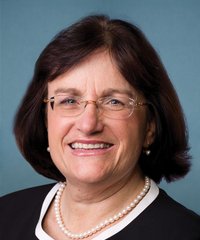
Annie Kuster was born and raised in Concord, New Hampshire to a family that taught her the values of kindness and empathy. Growing up, Annie helped her late mother, State Senator Susan McLane, who served in the NH House and Senate for over 25 years and was a pioneer for women in New Hampshire politics. Through that experience, Annie gained an appreciation for the good that government can do for communities and people, and a deep desire to help create positive change for Granite Staters. Her late father, Malcolm McLane, was Mayor of Concord, a New Hampshire Executive Councilor, and served as a prominent attorney for over 50 years.
Kuster is a member of the House Energy and Commerce Committee, where she serves on the Health Subcommittee, Energy Subcommittee, and the Oversight & Investigations Subcommittee. She is also a member of the House Agriculture Committee, where she serves on the Nutrition, Oversight, & Department Operations Subcommittee, Commodity Exchanges, Energy, & Credit Subcommittee, and Conservation & Forestry Subcommittee.
COVID-19 has brought tremendous challenges for people in New Hampshire and across the country, and the isolation has exacerbated the ongoing substance use crisis. It’s critical that Congress continues to support those in need — that’s why I founded the Bipartisan Addiction and Mental Health Task Force.
The Bipartisan Addiction and Mental Health Task Force merges the Bipartisan Opioid Task Force, founded in 2015, with Rep. David Trone’s (D-MD) Freshmen Working Group on Addiction. The purpose of the new Task Force is to combine efforts to make the most progress possible on addiction and mental health in the 117th Congress.
In the 117th Congress, I am working across the aisle with my fellow co-chairs to advance evidence-based policies to end the addiction and mental health crises in America through prevention and treatment. Already we are working on legislation to eliminate Medicaid exclusions and make it easier for everyone in need to access the treatment and support they need, regardless of their justice or socioeconomic status.